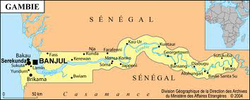The Gambia telecommunications regulatory authority prescribed as mandatory the identification of subscribers to the mobile phone. The deadline for the declaration expires June 15, 2012.
http://www.thejournalofregulation.com/spip.php?article1457

The Gambia has 1.7 million inhabitants and 4 mobile operators. It was common that people use prepaid cards purchased on the street, without revealing their identity. In January 2012, the telecommunications regulatory authority, the Public Utilities Regulatory Authority (PURA) enacted the obligation to identify the holder of a mobile phone; this declaration must be made before June 15, 2015. It is not possible since January to buy prepaid SIM cards and from June, if the identification is not made, the line will be suspended. Associations are protesting, seeing in this device a mechanism for monitoring of the population.
© thejournalofregulation
The mechanism of prepaid cards concerned the regulator for a number of reasons. This may be because it is obviously leads the consumer to pay the service more expensive that it should do, which justified the ban on promotional offers by Algerian regulator for this type of product.
This may be because this leads to uncontrolled consummation people who we don’t know the identity and which may be minor whereas the paid activity is dangerous, while is it the case in online games, which justifies the prohibition by the regulator online use of prepaid cards.
But there is here the "concern" that may cause to the public regulator, or the State to which it belongs, that is to say the lack of identity of the one who uses the mobile phone. The Government of the Gambia therefore found that this situation represents to people threatened by people "malicious» and represents also a serious risk to the State.
It is therefore appropriate to ensure more security of the population and the State. The regulator has therefore ruled in January 2012 the duty of identification of the holder of any number of mobile phone, the consequential removal of the lawful use of SIM prepaid card, the obligation to have no more recourse to one of the four operators registered in the Gambia, and provide their identity and official identification which will be transmitted to the regulator.
If the person does not follow this requirement from the regulator, as a firstly, it will cannot receive more calls, then, if it continues to not disclose the information provided, the line will be disconnected. The association for the defence of freedoms protested against what they consider to be the government’s will to release under supervision of the whole of the population, for example through the use of telephone tapping.
We cannot, in any case, in a particular way identify that it is the Government that justify the action taken by the regulator, while the institutional scheme of regulation would require that the two are independent for each other. There is in general a tension between freedom offered by new technologies and the will of the State security agencies (cf. request of the F.B.I. on the phone via the Internet).

votre commentaire